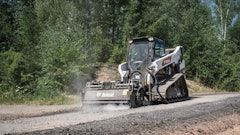AMAP's Paving Hall of Fame grew again this year with the induction of James Collins and Jean-Pascal Planche during a special ceremony that was held during AMAP's recent annual conference.
With lifelong careers in the modified asphalt industry, the men were recognized for their individual commitments and dedication to the improvement of highway materials and construction.
James Collins
As a former research chemist with Shell Development Company, Collins was responsible for new market and new product development in polymer-modified asphalt during the mid-to-late 1980s and early 1990's. He worked as part of a small group within the larger Shell organization that was focused on developing polymer-modified asphalt technologies based on those that were being used in Europe during the time, with the goal of making the European technologies applicable in the United States.
"This was when the Strategic Highway Research program was underway, and asphalt modifiers were really growing in Europe," said Collins. "But, in the U.S., many were still opposed to using additives. Our group at Shell believed in the improved quality and cost-performance benefits that polymer-modified asphalt could provide, and we used the quality benefits as a selling point."
Collins and his team worked closely with asphalt producers, contractors, department of transportation engineers and administrators, researchers and the sales and marketing teams at Shell to promote the benefits of modified asphalt, while also demonstrating the improved performance of modified asphalts by implementing highway test sections across the U.S.
In 1993, Collins took early retirement from Shell Development Company to start his own consulting business. Since then, he's provided research, development and consulting services to a wide variety of clients in the asphalt manufacturing, paving and roofing industries. His most notable efforts to date include his work to co-author a patent on the modified asphalt developed and implemented in Utah; his development of a binder that was used in the asphalt at a NASCAR track in Las Vegas; and his efforts to develop modified asphalt test sections in Alaska, a state which had previously been seen as unchartered territory.
Today, Collins continues his consulting work and spends his free time travelling to visit his children and grandchildren, and working with his wife to develop a wildlife preserve on his 25-acre ranch in central Texas.
"I never really thought I made that much of an impact on the modified asphalt industry, until I found out that I was being named to AMAP's Paving Hall of Fame," noted Collins. "This recognition is a true honor, and I'm grateful to AMAP for thinking of me."
Jean-Pascal Planche
As a native of France, Planche got his start in the modified asphalt industry 25 years ago as a research engineer for asphalt binders in the Refining and Marketing Research Center at Solaize, France-based oil company Elf Asphalt, Inc.
During that time, the company was in the process of developing a polymer-modfied asphalt, known as Styrelf®, that required further technical development for the U.S. market. By 1991, the project had brought Planche to Terre Haute, Indiana, where he worked at Elf's Central Laboratory on the transfer of Styrelf® technology from France to the USA. After two years in the states, Planche returned to Elf's Solaize, France Research Center where he spent seven years as team and project leader of asphalt binder research and development before relocating to Paris, France, to become marketing-research coordinator for Total Bitumen worldwide.
Having completed the majority of his work in France, Planche has first-hand knowledge of the ways in which asphalt binders are used overseas, and he says the United States and Europe can learn from one another.
"In Europe, asphalt pavement layers have well-defined roles requiring different binder types, and I think the U.S. could learn how to use PMA more efficiently in applications that really need those products," says Planche. "But with Europe lacking the performance-based specification system that's in place in the U.S., the U.S. may be in a position to take the lead in modified asphalt use."
As a Frenchman who's worked in the U.S. and has interacted with numerous other individuals from a variety of different cultures throughout his career, Planche considers his ability to unite all these cultural groups in the pursuit of better asphalt technology to be one of his greatest accomplishments. He says he has also been most proud of his work to carry out a variety of important modified asphalt research projects, communicate about them and develop them to a commercial/industrial level.
In October 2010, Planche got the opportunity to return to the U.S., after assuming new duties as vice president of transportation technology at the Western Research Institute (WRI) in Laramie, Wyoming. His current work includes team management, the supervision of large research projects and contracts, the commercialization of research products and the development of new research businesses.
"My goal is to help WRI Transportation Technology become a worldwide reference through the development of innovative, breakthrough asphalt products," said Planche.
Upon hearing that his work had earned him a place in AMAP's Paving Hall of Fame, Planche says he was shocked.
"I had to ask myself if this recognition was real," noted Planche. "I'm very proud of the honor, and I hope I deserve it. I want to be seen as a guy who's helping to make asphalt binders perform better and last longer in a more economic and sustainable way. If I'm doing that, then I'm doing my job.

























